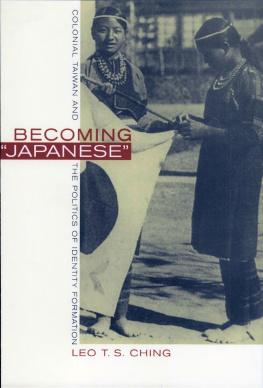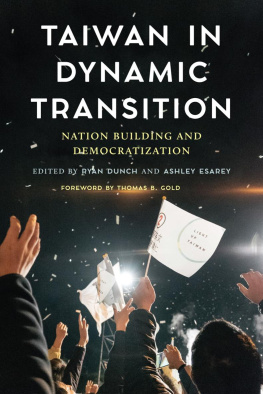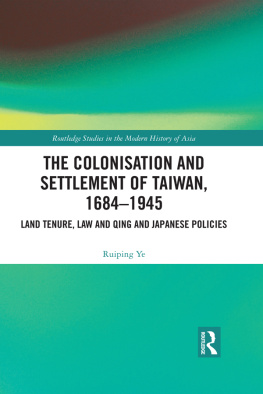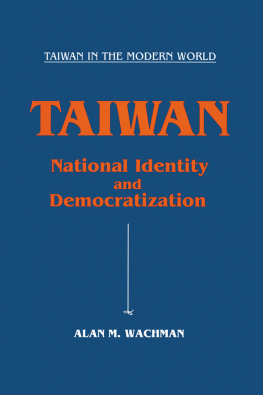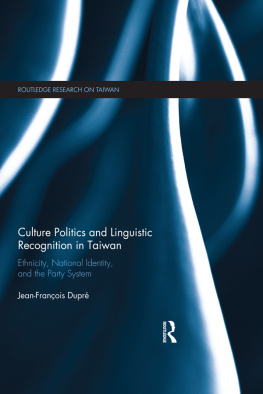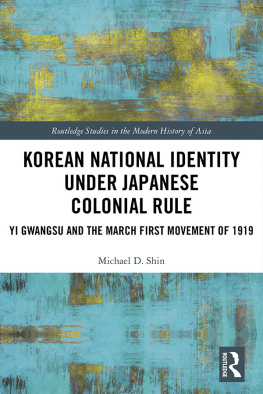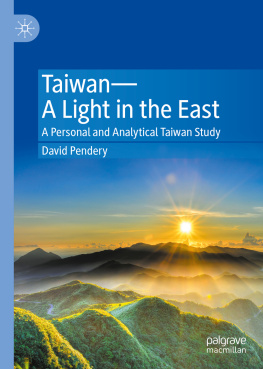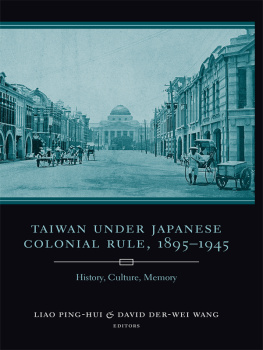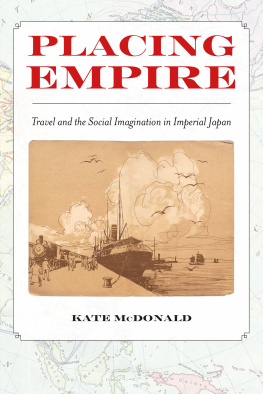Leo T. S. Ching - Becoming Japanese: Colonial Taiwan and the Politics of Identity Formation
Here you can read online Leo T. S. Ching - Becoming Japanese: Colonial Taiwan and the Politics of Identity Formation full text of the book (entire story) in english for free. Download pdf and epub, get meaning, cover and reviews about this ebook. year: 2001, publisher: University of California Press, genre: Politics. Description of the work, (preface) as well as reviews are available. Best literature library LitArk.com created for fans of good reading and offers a wide selection of genres:
Romance novel
Science fiction
Adventure
Detective
Science
History
Home and family
Prose
Art
Politics
Computer
Non-fiction
Religion
Business
Children
Humor
Choose a favorite category and find really read worthwhile books. Enjoy immersion in the world of imagination, feel the emotions of the characters or learn something new for yourself, make an fascinating discovery.
- Book:Becoming Japanese: Colonial Taiwan and the Politics of Identity Formation
- Author:
- Publisher:University of California Press
- Genre:
- Year:2001
- Rating:5 / 5
- Favourites:Add to favourites
- Your mark:
- 100
- 1
- 2
- 3
- 4
- 5
Becoming Japanese: Colonial Taiwan and the Politics of Identity Formation: summary, description and annotation
We offer to read an annotation, description, summary or preface (depends on what the author of the book "Becoming Japanese: Colonial Taiwan and the Politics of Identity Formation" wrote himself). If you haven't found the necessary information about the book — write in the comments, we will try to find it.
Leo T. S. Ching: author's other books
Who wrote Becoming Japanese: Colonial Taiwan and the Politics of Identity Formation? Find out the surname, the name of the author of the book and a list of all author's works by series.
Becoming Japanese: Colonial Taiwan and the Politics of Identity Formation — read online for free the complete book (whole text) full work
Below is the text of the book, divided by pages. System saving the place of the last page read, allows you to conveniently read the book "Becoming Japanese: Colonial Taiwan and the Politics of Identity Formation" online for free, without having to search again every time where you left off. Put a bookmark, and you can go to the page where you finished reading at any time.
Font size:
Interval:
Bookmark:
Leo T. S. Ching
For my mother, Chin;-Huang Wen-Huan
This book, in retrospect, is founded on fragments and traces of personal memory, despite its attempt at intellectual understanding and theoretical rigor. They are recollections and images that traverse three places from the late i 96os to the mid- i98os. In Taiwan, there was my maternal grandmother's fondness for things Japanese; my not being allowed to play with the "Taiwanese" kids in the neighborhood; one of my uncle's (a "mainlander") constant references to the Japanese as "little devils"; the aboriginal dance I saw as a little kid; the siren and drills at school for the impending "Chinese invasion." In Japan: the indescribable fear I had at the age of ten when I first saw a group of mainland Chinese in Mao suits; the Japanese men, with their golf bags and expectant grins, waiting for the next flight to Taipei to see their "girlfriends"; a sixtysomething Taiwanese obasan who continues to extend her tourist visa every six months to stay in Japan; the small kuan-ti (one of the Chinese deities popular in Taiwan) temple in Kobe. In China: the anxiety of meeting my paternal relatives for the first time to inform them of my father's passing away, after their forty-year separation; an old Japanese coal factory in Shenyang; the "soft seat" train cars for the "foreign" visitors and the "hard seat" cars for the Chinese; my grandfather, upon seeing me for the first time, his voice choked in tears, saying to me, "Good, good, you have come home."
Only much later did I realize that these personal experiences of my formative years are embedded in and diffused by several historical conditions: Japanese imperialism and colonialism, civil war in China, postwar Kuomintang (KMT) anti-Communist authoritarianism in Taiwan, American Cold War policies and post-Cold War China-Taiwan relations. At some level, this book is an attempt to make some sense of the relationship between the personal and the historical, to seek coherence where coherence seems impossible. It is an attempt to understand how historical events have enabled, or disabled, certain ways in which people make sense of and come to terms with their belongings, their allegiances, and their situatedness. It is also an attempt to understand how these formations of identity in turn rearticulate and redefine historical events and the way people imagine political possibilities.
This book would not have been possible without the encouragement, support, and guidance of many people. I owe a great deal to Masao Miyoshi for his generosity, humor, and intelligence. He taught me not only how to approach intellectual endeavors with critical and political sensibility, but also how to relate to other people with decency, empathy, and commitment. I thank him for putting up with my ignorance, naivete, and restlessness. I only hope this book in some small way justifies his continuous support and trust. Teachers and friends during my graduate studies at the University of California at San Diego have in different ways affected and enhanced my intellectual growth and personal life. William Tay encouraged me to study colonial literature in Taiwan when I knew nothing about it. Lisa Lowe continually supported and pushed me to think in more complex and nuanced ways. Jim Fujii, Christena Turner, and Wai-lim Yip provided the opportunity to further develop my project with their critical and invaluable comments. Without their kindness and understanding, this would not have been possible. Ben Bertram, Eric Cazdyn, Kiyota Tomonori, Miyata Yuko, Sahng-young Moon, Arnie Parry, Irene Wei, and Mitsuhiro Yoshimoto all helped to make high theory more grounded and graduate school more bearable. I am grateful for their comradeship.
I would also like to thank Kuan-Hsing Chen for giving me an opportunity to present some of my research in Chinese for the first time at the National Tsing-hua University in Taiwan. He has always inspired me with his intellectual energy and political commitment. Tomiyama Ichiro of Osaka University and Ota Yoshinobu of Kyushu University have been more than generous with their time and friendship. I have learned much from them. Several scholars of Japanese and Taiwanese studies in the United States have directly and indirectly affected my thinking and writing. I would like to acknowledge Sung-sheng Yvonne Chang, Mellie Ivy, Norma Field, Tak Fujitani, Naoki Sakai, Miriam Silverberg, Stefan Tanaka, and John Treat. I am grateful for their encouragement and support.
Colleagues at Duke University have provided intellectual energy that is both stimulating and rewarding. I thank Stan Abe, Arif Dirlik, Michael Hardt, Fred Jameson, Bruce Lawrence, Alberto Moreiras, Charlie Piot, and Ken Surin for their intelligence and friendship. I must particularly thank Walter Mignolo for involving me in the conference entitled "Globalization and the Relocation of Languages and Literatures" and for our many discussions of competing colonialisms. I am grateful to the entire Department of Asian and African Languages and Literature and to the Japanese Studies faculty for their wonderful generosity. Anne Allison, miriam cooke, Kris Troost, and Karen Wigen have always been supportive and encouraging. I must also thank Eric Zakim and Gennifer Weisenfeld for being both good colleagues and trusting friends. Gail Woods made coming to the office every day a pleasant experience. The Asian Pacific Studies Institute has provided me with many forums for scholarly exchange and with financial support for traveling to conferences. I am especially grateful to the director, Nan Lin, for putting Asian Studies on the Duke map and to Mavis Mayer for making everything work. Ralph Litzinger has been an intellectual interlocutor, a drinking buddy, and a partner in crime. I have turned to him often for thoughtful criticism and supportive friendship. Jing Wang's intellectual energy and humanity have always been an inspiration to me. She has always been there to show me the strengths as well as the limitations of my thinking.
I would like to thank Sheila Levine at the University of California Press for her interest in this project and her unwavering support. Two anonymous readers and Ken Pomeranz provided substantial and constructive suggestions regarding the early manuscript. I am grateful for their comments and encouragement. My gratitude also extends to Nick Murray, my copy editor, and Jan Spauschus Johnson, my project editor.
Justin Hong-en Ching was born during the preliminary stage of this project. Some of the writing was done with him napping on my shoulder. Despite the sleepless nights and chaotic days, he has brought a much-needed human perspective to intellectual work and academic professionalization. As always, Laura Tran has been my foremost supporter, believing in the project when I felt like giving up. Without her sacrifices and understanding, I could not have completed this manuscript. Finally, I dedicate this hook to my mother for her strength, forbearance, and kindness.
Throughout this book, East Asian names, except for those who are resident outside East Asia or have published in English, are written in the East Asian order: family name first. All translations from Japanese and Chinese to English are mine unless otherwise indicated.
Font size:
Interval:
Bookmark:
Similar books «Becoming Japanese: Colonial Taiwan and the Politics of Identity Formation»
Look at similar books to Becoming Japanese: Colonial Taiwan and the Politics of Identity Formation. We have selected literature similar in name and meaning in the hope of providing readers with more options to find new, interesting, not yet read works.
Discussion, reviews of the book Becoming Japanese: Colonial Taiwan and the Politics of Identity Formation and just readers' own opinions. Leave your comments, write what you think about the work, its meaning or the main characters. Specify what exactly you liked and what you didn't like, and why you think so.

